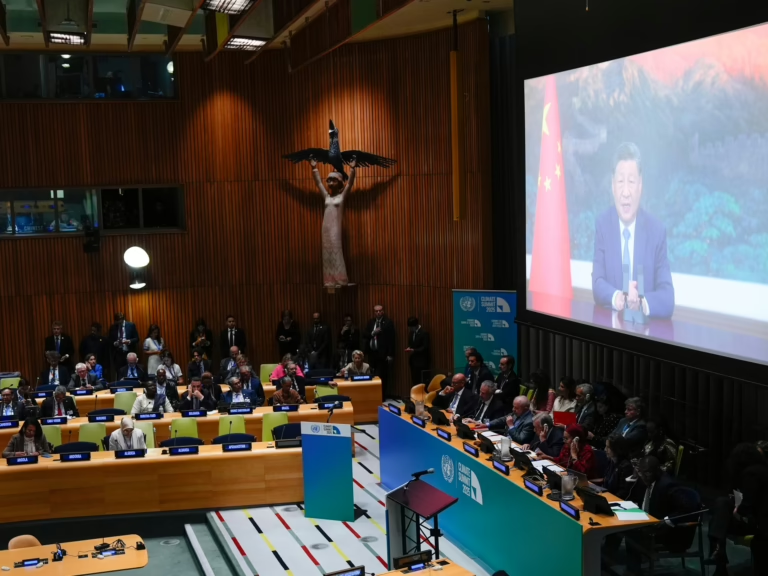During a prominent climate summit on Wednesday, President Xi Jinping announced that China aims to reduce its carbon emissions by 7 to 10 percent by the year 2035, marking a significant commitment from the globe’s top emitter of greenhouse gases.
In addition to this overarching emissions reduction target, Xi revealed plans to expand China’s wind and solar power capacity to over six times the amount recorded in 2020 within the next decade. The country also intends to raise the proportion of non-fossil fuel energy sources in its total energy consumption to exceed 30 percent.
In his video message, Xi emphasized the goal of mainstreaming zero-emission vehicles and establishing a society that is resilient to climate change impacts.
Currently, China is responsible for more than 31 percent of global carbon dioxide emissions.
Simultaneously, Xi urged developed nations to lead by example in enhancing climate action efforts. Without explicitly naming the United States, he criticized its retreat from the commitments outlined in the Paris Agreement.
“The shift towards green and low-carbon development is an inevitable trend of our era. Although some countries resist this movement, the international community must remain steadfast, confident, and proactive in its climate endeavors,” Xi stated, calling for strengthened global collaboration on climate issues.
Just a day earlier, US President Donald Trump, in his address to the United Nations General Assembly, dismissed climate change as a “hoax” and criticized both the European Union and China for their investments in renewable energy technologies.
Trump also announced a second withdrawal of the United States from the Paris Agreement, a global pact designed to limit the rise in average global temperatures to no more than 1.5 degrees Celsius (2.7 degrees Fahrenheit) through national climate commitments. The US remains the largest historical emitter of greenhouse gases and ranks second in current emissions, following China.
European Commission President Ursula von der Leyen highlighted the EU’s progress, noting increased investments in renewable infrastructure and carbon pricing mechanisms, which have contributed to a nearly 40 percent reduction in emissions since 1940.
Brazilian President Luiz Inacio Lula da Silva, host of the forthcoming climate conference, underscored the universal threat of climate change, stating, “No nation is immune to the consequences of climate disruption. Borders cannot shield us from droughts or hurricanes. Nature does not recognize military might or political power.”
UN Secretary-General António Guterres reinforced the urgency, declaring, “Scientific evidence demands immediate action. Legal frameworks require it. Economic realities make it necessary. And the global population is demanding it.”
Pakistani Prime Minister Muhammad Shehbaz Sharif shared the devastating impact of recent floods in his country, which have affected over five million people across thousands of villages and resulted in more than 1,000 fatalities.
“At this moment, Pakistan is grappling with severe monsoon rains, flash floods, landslides, and urban inundations,” he said. “This disaster compounds the lingering effects of the 2022 floods, which caused losses exceeding $30 billion and displaced millions.”
Under the 2015 Paris climate accord, 195 countries are expected to submit updated, more ambitious five-year plans detailing how they will reduce carbon emissions.
UN officials have stressed the importance of receiving these updated commitments by the end of the month to accurately assess the projected global temperature rise based on current pledges.
Former US President Joe Biden submitted the United States’ updated climate plan late last year before leaving office.
Prior to the Paris Agreement, projections indicated a potential global temperature increase of 4 degrees Celsius (7.2 degrees Fahrenheit) above pre-industrial levels. Thanks to international efforts, this estimate has been lowered to approximately 2.6 degrees Celsius (4.7 degrees Fahrenheit), according to Guterres.
Nevertheless, the Paris Agreement’s target remains to limit warming to 1.5 degrees Celsius since the mid-19th century, while the planet has already warmed by about 1.3 degrees Celsius (2.3 degrees Fahrenheit).

















